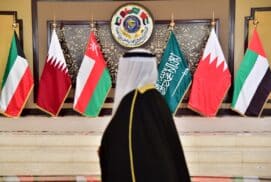Analyses
International Affairs
- Hussein Ibish 18 April 2025In the increasingly surreal second Donald Trump administration, a 29-year-old Salvadoran named Kilmar Abrego Garcia now embodies the most fundamental restructuring of the US constitutional order, arguably in its history. Mr Garcia is being used as a test case for the Trump administration to decouple Americans from the rule of law and protection of courts. His case may be operating at the margins of American society, but its implications potentially represent a redefinition of the relationship between the individual and the US government.
- Editorial Board 10 April 2025“It is up to all of us to fix this.” In his first public speech since Donald Trump’s return to the presidency, Barack Obama urged Americans to defend democratic values and called on institutions—particularly universities and law firms—to resist the administration’s attacks. “I have deep differences of opinion with my most immediate successor—who’s now president once again,” Obama told students of Hamilton College, without naming Trump directly, “but at least for most of my time, I’d say the post-World War II era, there was a broad consensus between Democrats, Republicans, conservatives, liberals around a certain set of rules where we settle our differences—[…] bonds that transcend party, region, or ideology.”
- Fabio Turco 17 March 2025On May 18, Polish voters will head to the polls for the first round of the presidential elections. A ballot, which is highly likely, is scheduled for June 1. After a year and a half in power, the center-liberal-progressive coalition—comprising the Civic Coalition, Third Way, and Lewica parties, and led by Donald Tusk—faces a true validation test. Depending on the outcome, this election could have significant repercussions for the legislature.
- Mariano Giustino 12 March 2025The fact that one of the longest conflicts in contemporary history, which has resulted in over 40,000 deaths, could soon come to an end is undoubtedly an event worth celebrating. Kurdistan Workers’ Party (PKK) leader Abdullah Ocalan has ordered the armed wing of the party he founded in 1978 to end the armed struggle and dissolve the organization. Is this the end of an era? It’s still too early to say.
- Gaetano Pentassuglia 6 March 2025However exceptionally dramatic and complex current (new and old) conflicts like Ukraine and Palestine are, it is hard to believe that the vast and long-established network of legal relationships between states, and between the latter and non-state actors alike—the almost unlimited number of areas governed by over 250,000 international treaties, customary rules, and over 2,000 sectoral global regimes—will fall to pieces as a result of contingent geopolitical considerations (even though, admittedly, the new geopolitical context may stay with us for some time to come).
- Seán Golden 3 March 2025It is extremely difficult to accurately predict what will unfold in Trump’s relations with China or their effects on the rest of the world, but it may be possible to identify and analyze some of the major scenarios in which they will unfold, including the emerging post-Bretton Woods world order, world trade, the role of science, technology, engineering, and mathematics (STEM) in a global setting, and security issues.
- Hussein Ibish 24 February 2025Saudi Arabia hosted a meeting on February 21 with all six Gulf Cooperation Council countries plus the crucial additions of Egypt and Jordan to begin crafting a formal Arab response to President Donald J. Trump’s fantastical scheme to redevelop Gaza after removing its 2.2 million Palestinian residents. Trump’s supporters and officials claim that this sudden Arab urgency to respond with an alternative to his Gaza plan is a diplomatic achievement and the real purpose of his radical proposal. Yet whatever the Arab countries come up with at this GCC +2 meeting, or at the March 4 full convening of the Arab League, will not be practicable given Israel’s policies.
-
- Federica Zoja 15 February 2025“Every day there’s something new. Donald Trump’s political agenda is totally unpredictable: today it’s the Gaza Strip, tomorrow it will be Ukraine!” Sebastien Boussois, an analyst and researcher at the Université Libre de Bruxelles and at Uqam in Montreal, is one of the most authoritative voices in the French-speaking world on the subject of relations between the West and the Gulf States. In the aftermath of Riyadh’s vehement opposition to the American proposal to empty Gaza and rebuild it, his first comment is unequivocal: “It’s all a show, a complete charade! I think that Saudi Arabia, through the voice of its Foreign Minister, is obliged to reject Trump’s proposal for annexation. But also that there is no lasting or solid agreement in the region as strong as the one between the United States and Saudi Arabia: let us remember, it dates back to 1945, after the end of the Second World War.”











